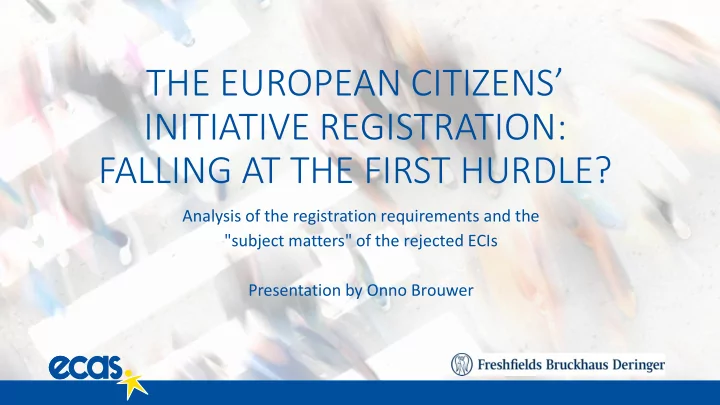

THE EUROPEAN CITIZENS’ INITIATIVE REGISTRATION: FALLING AT THE FIRST HURDLE? Analysis of the registration requirements and the "subject matters" of the rejected ECIs Presentation by Onno Brouwer
The European Citizens’ Initiative Since 1 st of April 2012 49 ECIs have been proposed to the European Commission 29 were registered (22 unique) 20 refused 9 withdrawn 3 collected more than 1 million signatures
The Registration Process Art. 4(2) of Regulation 211/2011 A citizens’ committee must be in place; The proposed initiative must not “manifestly fall outside the framework of the Commission’s powers to submit a proposal for a legal act of the Union for the purposes of implementing the Treaties ” (Legal admissibility test); The proposed initiative must “not be manifestly abusive, frivolous or vexatious” ; and The proposed initiative must “not be manifestly contrary to the values of the Union”, as set out in Art. 2, TEU.
Interpretation of the “manifestly outside” The Commission argues that a proposed citizens’ initiative will fall: “ outside ”: none of the Treaty provisions can serve as a legal basis for the legal act proposed by the citizens’ initiative “ manifestly outside”: none of the Treaty provisions could serve as a legal basis – irrespective of factual circumstances .
Application of the criteria by the European Commission Each letter rejecting registration has wording along the following lines: “ The Commission considers that there is no legal basis in the Treaties which would allow a proposal for a legal act with the content you envisage. ”
Legal analysis of rejected initiatives The study suggests that there are three categories of refusal decisions • Category 1: Initiatives that were clearly outside the EU’s competences • Category 2: Initiatives that, upon further scrutiny, appear to fall outside the EU’s competences • Category 3: Initiatives that may well have been within the EU’s competence
Category 1: Initiatives that were clearly outside the EU’s competences Many are manifestly outside, because a Treaty amendment would be required. Examples: “Citizens of a new State, which has seceded from a Member State should be citizens of the EU ” “ Proposal to create a European, public bank founded on social and ecological development ”
Category 2: Initiatives that, upon further scrutiny, appear to fall outside the EU’s competences Initiatives that, upon further scrutiny, fall outside the Commission’s powers, because the specific proposal was beyond the EU’s competence, even though the general policy area was – or appeared to be – dealt with in the Treaties Example: “Abolition of bullfighting in Europe and cruelty to bulls for entertainment” “ Concern for pets and stray animals ” “Ethics for animals and kids” “For a Europe without legalised prostitution ”
Category 3: Initiatives that may well have been within the EU’s competence Initiatives that may well have been within the Commission’s powers, because it is a matter of Treaty interpretation whether the proposals fall within the EU’s competence under the Treaties – depending on factual circumstances Examples: “Right to life-long care: leading a life of dignity and independence is a fundamental right! ” Unconditional Basic Income” .
(Other) decisions that raise questions A review of the initiatives that the Commission has chosen to register also raises questions about its decision-making in this area. In particular, a number of initiatives that were registered appear to fall “manifestly outside” the Commission’s power to propose a legal act of the Union. Examples: “Termination of the EU/Swiss Agreement on Free Movement of Persons” “For responsible waste management, against incinerators”
Main Conclusions ECAS ’ analysis of the subject matters of the Refused initiatives suggests that, at least in a number of cases, the Commission has erred in its decision to refuse registration. the legal admissibility test was too narrowly applied (e.g. because the proposed initiative correctly identified a legal basis in the Treaties, and the subject matter of the initiative fell within the scope of the EU’s competence); the decision to refuse registration was arbitrary (e.g. because initiatives with similar characteristics were treated differently); and/or the reasons given for rejection were incomplete (e.g. because the Commission did not fully address all the Treaty provisions cited as a legal basis).
Recommendations for the upcoming review of the Regulation (1) Clarify through public debate the nature of the ECIs as an agenda- setting instrument Define the remit of the “legal act” and/or of the political actions that the European Commission can initiate or undertake
Recommendations for the upcoming review of the Regulation (2) Provide a definition of “manifestly outside” that is clear, easy to understand and is not subject to arbitrary interpretation Clarify the procedure for the legal admissibility test and ensure transparency of the decision-making process
Recommendations for the upcoming review of the Regulation(3) Establish an ECI officer, similar to the Hearing Officer in competition law Secure adequate legal advice for ECI organisers with regard to the legal basis of initiatives
Thank you Onno Brouwer, Joep Wolfhagen, Daniel Baker Freshfields Bruckhaus Deringer LLP
Recommend
More recommend